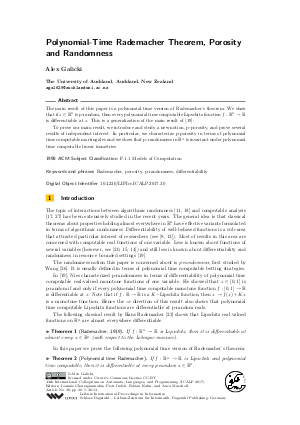Polynomial-Time Rademacher Theorem, Porosity and Randomness
Author Alex Galicki
-
Part of:
Volume:
44th International Colloquium on Automata, Languages, and Programming (ICALP 2017)
Part of: Series: Leibniz International Proceedings in Informatics (LIPIcs)
Part of: Conference: International Colloquium on Automata, Languages, and Programming (ICALP) - License:
 Creative Commons Attribution 3.0 Unported license
Creative Commons Attribution 3.0 Unported license
- Publication Date: 2017-07-07
File

PDF
LIPIcs.ICALP.2017.30.pdf
- Filesize: 0.52 MB
- 13 pages
Document Identifiers
Subject Classification
Keywords
- Rademacher
- porosity
- p-randomness
- differentiability
Metrics
- Access Statistics
-
Total Accesses (updated on a weekly basis)
0Document
0Metadata
Abstract
The main result of this paper is a polynomial time version of Rademacher's theorem. We show that if z is p-random, then every polynomial time computable Lipschitz function f:R^n->R is differentiable at z. This is a generalization of the main result of [Nies, STACS2014]. To prove our main result, we introduce and study a new notion, p-porosity, and prove several results of independent interest. In particular, we characterize p-porosity in terms of polynomial time computable martingales and we show that p-randomness in R^n is invariant under polynomial time computable linear isometries.
Cite As Get BibTex
Alex Galicki. Polynomial-Time Rademacher Theorem, Porosity and Randomness. In 44th International Colloquium on Automata, Languages, and Programming (ICALP 2017). Leibniz International Proceedings in Informatics (LIPIcs), Volume 80, pp. 30:1-30:13, Schloss Dagstuhl – Leibniz-Zentrum für Informatik (2017)
https://doi.org/10.4230/LIPIcs.ICALP.2017.30
BibTex
@InProceedings{galicki:LIPIcs.ICALP.2017.30,
author = {Galicki, Alex},
title = {{Polynomial-Time Rademacher Theorem, Porosity and Randomness}},
booktitle = {44th International Colloquium on Automata, Languages, and Programming (ICALP 2017)},
pages = {30:1--30:13},
series = {Leibniz International Proceedings in Informatics (LIPIcs)},
ISBN = {978-3-95977-041-5},
ISSN = {1868-8969},
year = {2017},
volume = {80},
editor = {Chatzigiannakis, Ioannis and Indyk, Piotr and Kuhn, Fabian and Muscholl, Anca},
publisher = {Schloss Dagstuhl -- Leibniz-Zentrum f{\"u}r Informatik},
address = {Dagstuhl, Germany},
URL = {https://drops.dagstuhl.de/entities/document/10.4230/LIPIcs.ICALP.2017.30},
URN = {urn:nbn:de:0030-drops-74033},
doi = {10.4230/LIPIcs.ICALP.2017.30},
annote = {Keywords: Rademacher, porosity, p-randomness, differentiability}
}
Author Details
References
- G. Petruska A. M. Bruckner, M. Laczkovich and B. S. Thomson. Porosity and approximate derivatives. Canadian Journal of Mathematics, 38:1149-1180, 1986. URL: http://dx.doi.org/10.4153/CJM-1986-058-7.
- K. Ambos-Spies, H. Fleischhack, and H. Huwig. P-generic sets, pages 58-68. Springer Berlin Heidelberg, 1984. URL: http://dx.doi.org/10.1007/3-540-13345-3_5.
- K. Ambos-Spies, H. Fleischhack, and H. Huwig. Diagonalizations over polynomial time computable sets. Theoretical Computer Science, 51(1):177-204, 1987. URL: http://dx.doi.org/10.1016/0304-3975(87)90053-3.
- K. Ambos-Spies, S. A. Terwijn, and Z. Xizhong. Resource bounded randomness and weakly complete problems, pages 369-377. Springer Berlin Heidelberg, 1994. URL: http://dx.doi.org/10.1007/3-540-58325-4_201.
-
D. N. Bessis and F. H. Clarke. Partial subdifferentials, derivatives and Rademacher’s theorem. Transactions of AMS, 351(7):2899-2926, 1999.

- Miller J. Bienvenu L., Hölzl R. and Nies A. Denjoy, Demuth and density. Journal of Mathematical Logic, 14(01):1450004, 2014. URL: http://dx.doi.org/10.1142/S0219061314500044.
- J. M. Borwein and X. Wang. Cone-monotone functions: Differentiability and continuity. Canadian Journal of Mathematics, 57:961-982, 2005. URL: http://dx.doi.org/10.4153/CJM-2005-037-5.
-
V. Brattka, J. Miller, and A. Nies. Randomness and differentiability. Transactions of the AMS, 368:581-605, 2016. arXiv version at arxiv.org/abs/1104.4465.

-
A. M. Bruckner and B. S. Thomson. Porosity estimates for the Dini derivatives. Real Anal. Exch., 9:508-538, 1984.

-
R. Downey and D. Hirschfeldt. Algorithmic randomness and complexity. Springer-Verlag, Berlin, 2010. 855 pages.

-
R. G. Downey and D. R. Hirschfeldt. Algorithmic Randomness and Complexity. Springer-Verlag, 2010.

- Stephen A. Fenner. Functions that preserve p-randomness. Inf. Comput., 231:125-142, October 2013. URL: http://dx.doi.org/10.1016/j.ic.2013.08.009.
- C. Freer, B. Kjos-Hanssen, A. Nies, and F. Stephan. Algorithmic aspects of Lipschitz functions. Computability, 3(1):45-61, 2014. URL: http://dx.doi.org/10.3233/COM-14025.
- A. Galicki. Randomness and Differentiability of Convex Functions, pages 196-205. Springer International Publishing, Cham, 2015. URL: http://dx.doi.org/10.1007/978-3-319-20028-6_20.
- A. Galicki. Effective Brenier Theorem: Applications to Computable Analysis and Algorithmic Randomness. In Proceedings of the 31st Annual ACM/IEEE Symposium on Logic in Computer Science, LICS'16, pages 720-729, New York, NY, USA, 2016. ACM. URL: http://dx.doi.org/10.1145/2933575.2933596.
-
M. Khan. Lebesgue density and ∏₁⁰ classes. Journal of Symbolic Logic, 81(1):80-95, 2016.

-
Ker-I Ko. Complexity theory of real functions. Birkhauser Boston Inc., 1991.

- A. Nies. Computability and randomness, volume 51 of Oxford Logic Guides. Oxford University Press, Oxford, 2009. URL: http://dx.doi.org/10.1093/acprof:oso/9780199230761.001.0001.
- André Nies. Differentiability of polynomial time computable functions. In Ernst W. Mayr and Natacha Portier, editors, 31st International Symposium on Theoretical Aspects of Computer Science (STACS 2014), volume 25 of Leibniz International Proceedings in Informatics (LIPIcs), pages 602-613, Dagstuhl, Germany, 2014. Schloss Dagstuhl-Leibniz-Zentrum fuer Informatik. URL: http://dx.doi.org/10.4230/LIPIcs.STACS.2014.602.
- N. Pathak, C. Rojas, and S. G. Simpson. Schnorr randomness and the Lebesgue differentiation theorem. Proc. Amer. Math. Soc., 142(1):335-349, 2014. URL: http://dx.doi.org/10.1090/S0002-9939-2013-11710-7.
- D. Preiss and L. Zajíček. Directional derivatives of lipschitz functions. Israel Journal of Mathematics, 125(1):1-27, 2001. URL: http://dx.doi.org/10.1007/BF02773371.
-
J. Lindenstrauss, D. Preiss and J. Tišer. Fréchet Differentiability of Lipschitz Functions and Porous Sets in Banach Spaces. Annals of Mathematics Studies. Princeton University Press, 2012.

-
H. Rademacher. Über partielle und totale Differenzierbarkeit von Funktionen mehrerer Variabeln und über die Transformation der Doppelintegrale. Math. Ann., 79(1):340-359, 1919.

- O. Tapiola. Random and non-random dyadic systems in doubling metric spaces, 2012. MSc thesis. URL: http://hdl.handle.net/10138/37603.
- Brian S. Thomson. Real functions. Lecture Notes in Mathematics. 1170. Berlin etc.: Springer-Verlag. VII, 229 p. DM 31.50 (1985)., 1985. URL: http://dx.doi.org/10.1007/BFb0074380.
-
Y. Wang. Randomness and Complexity. PhD dissertation, University of Heidelberg, 1996.

-
K. Weihrauch. Computable Analysis. Springer, Berlin, 2000.

